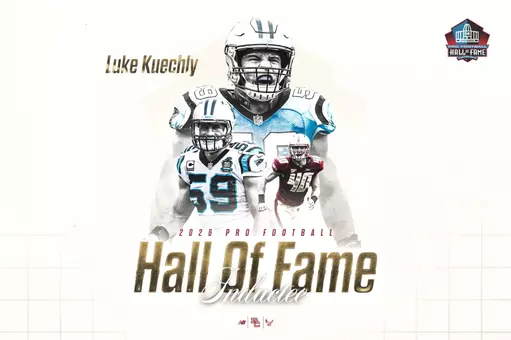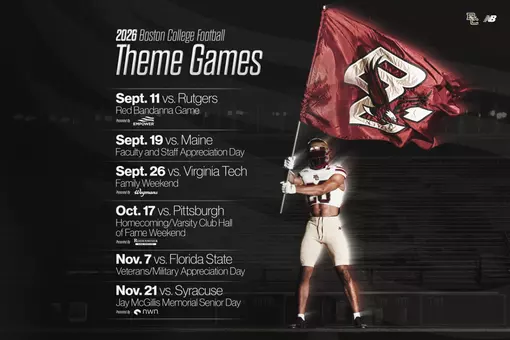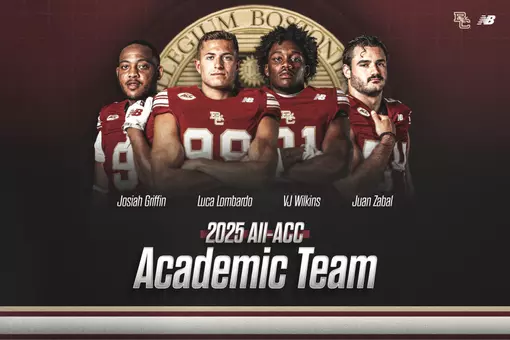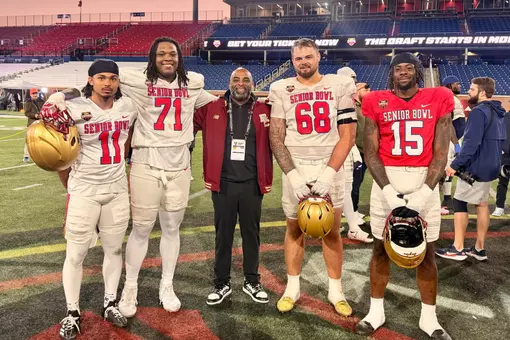Boston College Athletics
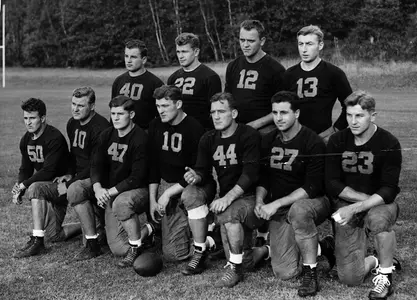
Returning to Fenway Park
November 13, 2015 | Football
The Eagles compete in the Shamrock Series on Nov. 21
Written by Reid Oslin
The Boston College Eagles will be returning to a once-familiar setting for their next gridiron contest: Boston's Fenway Park.
After a much-needed week off, head coach Steve Addazio's BC team will face Notre Dame at the Olde Towne Field – for many years the Eagles' home gridiron – in a Nov. 21 game that will be part of the Fighting Irish's "Shamrock Series" and thus a "home" game for the lads from South Bend.
The Boston College football team was once a prime tenant at Fenway. The Eagles "hosted" two home games at the Lansdowne Street sports shrine in 1914: meeting Norwich University in the first college football game played at the two-year-old baseball park on Oct. 31 of that year. BC tripped Norwich by a 28-6 score in that one, and followed with a season-ending 14-0 whitewash of Catholic University in the Nov. 26 finale of the 1914 campaign.
In the ensuing 44 years, Boston College played 101 times at Fenway, winning 75, losing only 21 and playing five tie games.
The last time a college game was played at Fenway was Dec. 1, 1956, when the Eagles dropped a 7-0 decision to the then-archrival Holy Cross Crusaders. Red Sox owner Tom Yawkey, fearful that the college games were tearing up his lush outfield lawn, banned football from Fenway and forced Boston College to build a new on-campus facility on the present site of Alumni Stadium to play its home games.
Among the 101 games that the Eagles played at Fenway, one clearly stands out as true college football lore: a thrilling 19-18 victory over previously unbeaten Georgetown on Nov. 16, 1940 that legendary sportswriter Grantland Rice termed "probably the greatest football game ever played by colleges or by pros."
Rice's effusive description was well-warranted. Both teams were undefeated coming into the Fenway matchup – Georgetown's Hilltoppers having won 23 games in a row – and the 8-0 Eagles, ranked No. 8 at the time, had their eyes on a potential national championship run.
More than 40,000 fans packed Fenway on a cold, gray November day to witness the thrilling football battle.
Georgetown struck first with a 42-yard field goal from Augio Lio, an All-America guard who hailed from East Boston, and a one-yard touchdown plunge from Julius Koshlap. It was the first time in the entire season that the Eagles had been behind on the scoreboard.
It was short-lived, however, as BC running back Henry Woronicz snared a wobbly deflected option pass from halfback Lou Montgomery and raced the final five yards into the endzone on a 21-yard touchdown play.
In the second period, BC's offense began to gain traction and future hall of fame fullback Mike Holovak capped a 90-yard drive with his own one-yard touchdown dive, and the home team took a 13-10 lead into the halftime break.
Georgetown opened the third period with a long scoring drive, capped by blocking back Joe McFadden's short touchdown run on a surprise reverse play to take a 16-13 advantage. BC's Monk Maznicki then blocked Lio's extra-point kick, setting the stage for some eventual end-of-game heroics by BC.
At that point, Boston College coach Frank Leahy decided to abandon his ground game attack and move into a passing mode. Eagles' All-America halfback "Chuckin' Charlie" O'Rourke (the halfback was the passer in Leahy's system) took over, firing BC down the field and hitting Maznicki with a 43-yard scoring bomb to put the Eagles back on top, 19-16. The Malden, Mass. native passed for 61 of BC's 66 yards on the scoring drive. O'Rourke would finish the game completing 14-of-23 passes for 209 yards – an immense passing output for those days when the traditional ground game ruled the day.
The teams battled back and forth through the fourth quarter with neither one able to score an offensive point. Late in the game, BC found itself mired on its own nine-yard line facing a fourth down. O'Rourke, who also handled punting chores, dropped back into the end zone, apparently to kick. But once there, he darted from side to side, constantly eluding the Georgetown pursuit and killing the clock before kneeling to take a safety. Georgetown got two points, but because of the previous blocked kick, could not tie the Eagles with the two-point bonus. From there, BC free-kicked the ball safely down the field and the game ended with Boston College emerging as 19-18 victors.
Rice, the preeminent sports writer of his day, gushed praise in his nationally-syndicated football column that appeared in newspapers across the land the following morning:
"In many ways it was probably the greatest football game ever played by colleges or by pros… There was every type of play that football has yet seen. There were double and triple passes. There were double reverses. There were spreads and shifts and fakes and feints that kept the packed stands not only thrilled but completely bewildered.
"It was the greatest all-around exhibition of power, skill and flaming spirit that I have ever seen on a football field for over 40 years."
Let's hope, that when the Eagles return to Fenway in two weeks, history repeats itself.
The Boston College Eagles will be returning to a once-familiar setting for their next gridiron contest: Boston's Fenway Park.
After a much-needed week off, head coach Steve Addazio's BC team will face Notre Dame at the Olde Towne Field – for many years the Eagles' home gridiron – in a Nov. 21 game that will be part of the Fighting Irish's "Shamrock Series" and thus a "home" game for the lads from South Bend.
The Boston College football team was once a prime tenant at Fenway. The Eagles "hosted" two home games at the Lansdowne Street sports shrine in 1914: meeting Norwich University in the first college football game played at the two-year-old baseball park on Oct. 31 of that year. BC tripped Norwich by a 28-6 score in that one, and followed with a season-ending 14-0 whitewash of Catholic University in the Nov. 26 finale of the 1914 campaign.
In the ensuing 44 years, Boston College played 101 times at Fenway, winning 75, losing only 21 and playing five tie games.
The last time a college game was played at Fenway was Dec. 1, 1956, when the Eagles dropped a 7-0 decision to the then-archrival Holy Cross Crusaders. Red Sox owner Tom Yawkey, fearful that the college games were tearing up his lush outfield lawn, banned football from Fenway and forced Boston College to build a new on-campus facility on the present site of Alumni Stadium to play its home games.
Among the 101 games that the Eagles played at Fenway, one clearly stands out as true college football lore: a thrilling 19-18 victory over previously unbeaten Georgetown on Nov. 16, 1940 that legendary sportswriter Grantland Rice termed "probably the greatest football game ever played by colleges or by pros."
Rice's effusive description was well-warranted. Both teams were undefeated coming into the Fenway matchup – Georgetown's Hilltoppers having won 23 games in a row – and the 8-0 Eagles, ranked No. 8 at the time, had their eyes on a potential national championship run.
More than 40,000 fans packed Fenway on a cold, gray November day to witness the thrilling football battle.
Georgetown struck first with a 42-yard field goal from Augio Lio, an All-America guard who hailed from East Boston, and a one-yard touchdown plunge from Julius Koshlap. It was the first time in the entire season that the Eagles had been behind on the scoreboard.
It was short-lived, however, as BC running back Henry Woronicz snared a wobbly deflected option pass from halfback Lou Montgomery and raced the final five yards into the endzone on a 21-yard touchdown play.
In the second period, BC's offense began to gain traction and future hall of fame fullback Mike Holovak capped a 90-yard drive with his own one-yard touchdown dive, and the home team took a 13-10 lead into the halftime break.
Georgetown opened the third period with a long scoring drive, capped by blocking back Joe McFadden's short touchdown run on a surprise reverse play to take a 16-13 advantage. BC's Monk Maznicki then blocked Lio's extra-point kick, setting the stage for some eventual end-of-game heroics by BC.
At that point, Boston College coach Frank Leahy decided to abandon his ground game attack and move into a passing mode. Eagles' All-America halfback "Chuckin' Charlie" O'Rourke (the halfback was the passer in Leahy's system) took over, firing BC down the field and hitting Maznicki with a 43-yard scoring bomb to put the Eagles back on top, 19-16. The Malden, Mass. native passed for 61 of BC's 66 yards on the scoring drive. O'Rourke would finish the game completing 14-of-23 passes for 209 yards – an immense passing output for those days when the traditional ground game ruled the day.
The teams battled back and forth through the fourth quarter with neither one able to score an offensive point. Late in the game, BC found itself mired on its own nine-yard line facing a fourth down. O'Rourke, who also handled punting chores, dropped back into the end zone, apparently to kick. But once there, he darted from side to side, constantly eluding the Georgetown pursuit and killing the clock before kneeling to take a safety. Georgetown got two points, but because of the previous blocked kick, could not tie the Eagles with the two-point bonus. From there, BC free-kicked the ball safely down the field and the game ended with Boston College emerging as 19-18 victors.
Rice, the preeminent sports writer of his day, gushed praise in his nationally-syndicated football column that appeared in newspapers across the land the following morning:
"In many ways it was probably the greatest football game ever played by colleges or by pros… There was every type of play that football has yet seen. There were double and triple passes. There were double reverses. There were spreads and shifts and fakes and feints that kept the packed stands not only thrilled but completely bewildered.
"It was the greatest all-around exhibition of power, skill and flaming spirit that I have ever seen on a football field for over 40 years."
Let's hope, that when the Eagles return to Fenway in two weeks, history repeats itself.
BC Football Camp Report | Episode 6
Friday, August 22
Football: Offensive Coordinator Will Lawing Media Availability (August 21, 2025)
Thursday, August 21
Football: Special Teams Coordinator Matt Thurin Media Availability (August 21, 2025)
Thursday, August 21
Football: Defensive Backs Coach Cory Robinson Media Availability (August 21, 2025)
Thursday, August 21

